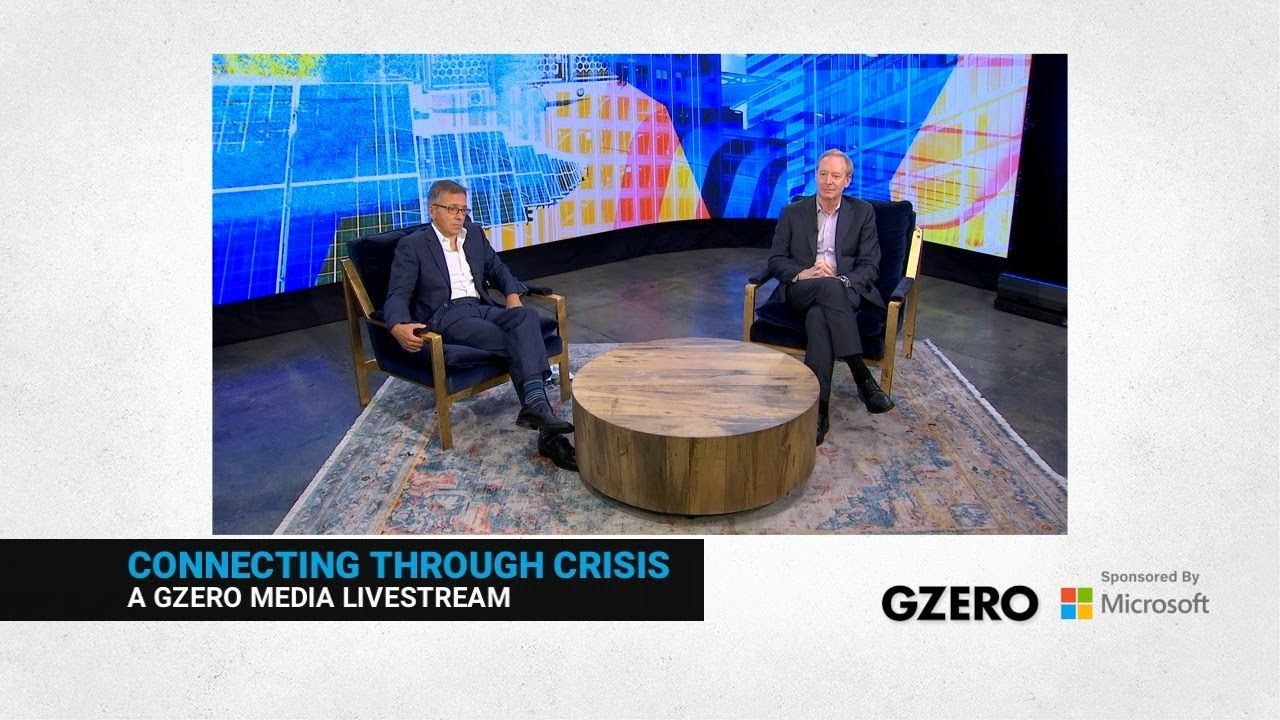
On September 23, GZERO Media — in partnership with Microsoft and Eurasia Group — gathered experts to discuss global recovery from the coronavirus pandemic in a livestream panel. Our panel for the discussion Crisis Response & Recovery: Reimagining while Rebuilding, included:
- Brad Smith, President, Microsoft
- Ian Bremmer, President and Founder, Eurasia Group & GZERO Media
- Jeh Johnson, Partner, Paul, Weiss, Rifkind, Wharton & Garrison, LLP and former Secretary of Homeland Security.
- John Frank, Vice President, UN Affairs at Microsoft
- Susan Glasser, staff writer and Washington columnist, The New Yorker (moderator)
Special appearances by UN Secretary-General António Guterres, European Central Bank chief Christine Lagarde, and comedian/host Trevor Noah.
Brad Smith on what global recovery from COVID-19 will look like:
We're living through a period of time when certain things are being accelerated by this crisis. One of the most obvious is digital technology. In some ways, it makes certain investment decisions for a digital technology company perhaps even somewhat easier than before, especially if one focuses on the long term. As this acceleration continues, I think we're clearly heading towards a world where this will end, eventually. We'll use the opportunity to be back together in person, but [for instance] the future of medicine I think has been altered for good.
António Guterres on the post-pandemic ideological divide:
[The pandemic] is exacerbating nationalism, populism, even xenophobia and racism in more extreme situations, and the denial of the needs of multilateral governments and institutions. The two things are now confronting each other. This will be a very important ideological battle in the months to come... I am not naïve and I know this is going to be a very tough ideological battle and it is not won. We might come out of it with the capacity to build back a world with more inclusive and sustainable perspectives, but we might come out of it with a world where chaos will become the main logic of international relations.
Jeh Johnson on the top global security risks in next six months:
Long term, in my view, the biggest risk to our nation and our world is climate change. As Barack Obama used to say, it's a slow-motion emergency. Therefore, our leaders fail to put it on the top of their inbox to address. Short term, we're in an election season. Our democracy is under threat both by external actors, those who seek to push out misinformation and extremist views. Frankly, the way Americans receive their information has led to the increased political polarization that we see right now [and] that very much affects our democracy.
Ian Bremmer on Russian disinformation in the US:
The Soviets historically did a lot more damage with disinformation than they did with their bomber jets. But the reason that we beat the Soviets is because ultimately, our ideas were better than theirs. Our values actually mattered more to their own people and to those that were behind the Berlin Wall. And that's what brought it down. Individual liberties, a free market that worked, and the ability to create opportunity both for those inside the country born and also those that tried so hard to get to the US. A lot of those ideas no longer feel as legitimate to the average American. The Russians are engaging in disinformation all over the world. But it's more effective in the US.
Christine Lagarde on the future of global governance in a post-pandemic world
I hope that [the pandemic] triggers momentum. I can tell you that from Europe, it has certainly encouraged and supported a much more collective and better governed collective response, irrespective of noise on the line, if you will (there will be, it's inevitable). At a global level, I hope that international organizations like the World Health Organization, or my favorite former institution, the International Monetary Fund, will come out of that hopefully stronger than they were when they went into the crisis, but the jury is out.
John Frank on closing the global digital gap:
[We hope that] the application of data science to medicine and the collaborations that are taking place will be sustained and change for the better, [as well as] the direction of therapies and the delivery of them to broad populations in the world. If people aren't connected you can't have telemedicine or online education. There's 4 billion people that aren't connected to the internet today, including 1.4 billion children who left the classroom. The needs are profound and that's not something one company can do [on its own], but by bringing in others and by raising these issues, we hope to see more progress.
Trevor Noah on whether we are better or worse after 75 years of the UN:
I always think the world is better off. I know it may not feel like it in the moment, but I think we steadily move forward as human beings and as a species. We have setbacks, we have moments that we really shouldn't have had, we have moments that we really wish we could delete from history and time and just bridge the gap to the more progressive moments, or moments where society moved forward. But I think we always are doing better.
This event was the second in a four-part livestream panel series about key issues facing the 75th United General Assembly. The next discussion, Digital Inclusion: Activating Skills for the Next Billion Jobs, will stream live on Wednesday, October 7, at 11 am ET.
See the schedule of upcoming events and watch our livestream panels here, and check out GZERO Media's special coverage of the 2020 edition of the world's largest diplomatic gathering, and the first ever virtual UNGA.